Conductor Miguel A.
Gómez - Martínez
A Conversation with Bruce Duffie
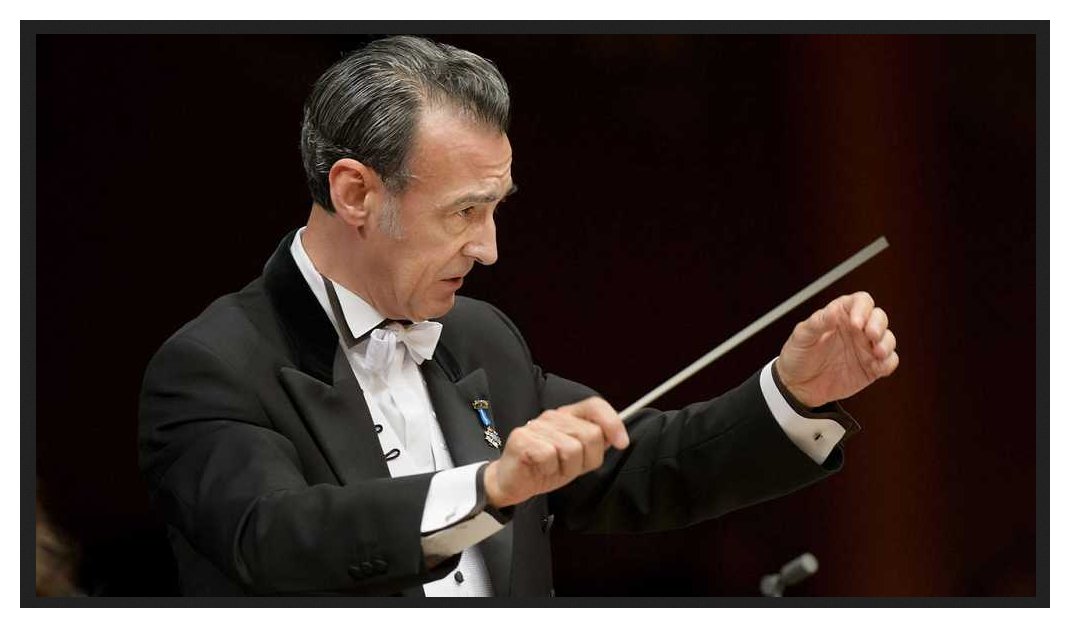
In the exciting 1982 Lyric Opera of Chicago season, with
many fine performances and
several surprises, the final two productions — Madama Butterfly and Luisa Miller — were
conducted by Miguel A. Gómez-Martínez, and
this webpage presents a conversation
I had at that time with the Spanish maestro. Though his name is
seen in various forms on recordings and in printed programs, the
use depicted here corresponds to the way it is presented on his
personal webpage.
Early in that season, the Artistic Director of Lyric Opera, Bruno
Bartoletti, had a heart attack and was forced to cancel his appearances
for the remainder of the fall. Gómez-Martínez,
who was already engaged for the Butterfly
production, agreed to stay longer and also handle Luisa Miller. Subsequently,
a fine Italian tenor, Giuliano Ciannella,
was making his debut in the new
production of Butterfly
directed by Hal Prince,
and
indeed made an impressive showing as Pinkerton in the first four
performances. [Others in the cast included Elena Mauti-Nunziata,
Sesto Bruscantini,
Elena Zilio, Florindo
Andreolli, Terry
Cook, John Del
Carlo, and Michelle
Harman-Gulick.] At this same time, Luciano Pavarotti, who had
been
contracted to sing in Luisa Miller,
withdrew suddenly leaving Lyric without a tenor for the relatively
unknown Verdi opera. However, Signor Ciannella is one of the very
few tenors in the world to have sung the role. Indeed, he had
previously had successes in Europe opposite both Katia Ricciarelli and Renata Scotto, so he
graciously stepped into the rehearsals and performances,
thus allowing Lyric a fine tenor for its last opera of the season, and
causing the much simpler problem of finding a new Pinkerton
— which is a
role in the repertoire of most tenors. [This would be Vasile Moldoveanu.]
Ciannella looked splendid
and sounded wonderful, and the Chicago audiences responded with cheers
at the close of each performance. [Others in the Luisa Miller cast included Ellen Shade, Wolfgang
Brendel, Dimitri Kavrakos, Paolo Washington, and Diane Curry, with the
production directed by Nathaniel
Merrill.] As usual, names which are links on this webpage
refer to my interviews elsewhere on my website.
Most of my interviews have been occasions of both serious inquiry and
relaxed conversation, and usually have been sprinkled with laughter
from both parties. This one, however, seemed to have more smiles
and humor than most. But during the course of our hour together,
my guest did impart much solid information and genuine opinion, and the
discussion ranged over many topics of interest.
His English was quite good, and, as expected, it was sprinkled with odd
words and mannerisms peculiar to the language of his birth. I
have straightened out many of these, but have also left in quite a
number of them when the meaning is still clear and the way he spoke was
simply too charming to correct.
Naturally, we began with the circumstances as related above . . . . . .
. . .
Bruce Duffie: We
were very lucky that we had a tenor
in the house who knew the one part, and then you could hire another
tenor for the more common part.
Miguel A. Gómez-Martínez:
Yes, that was fortune, a
real fortune.
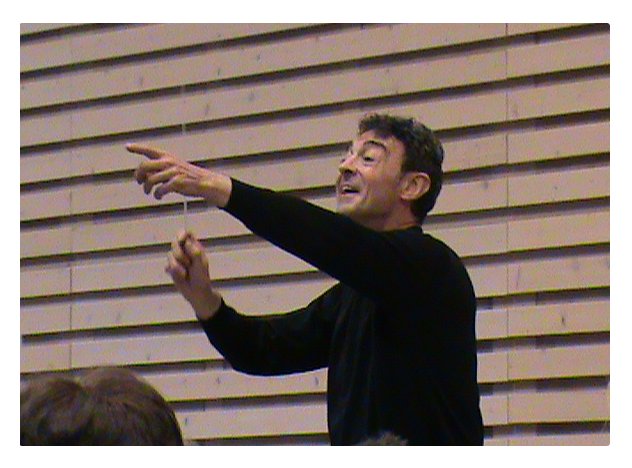 BD: Is this your
American debut?
BD: Is this your
American debut?
MAG-M: No, I
was in Houston already twice.
BD: I read in
your biography that you made
your conducting debut at age seven.
MAG-M: Yes.
BD: Is age
seven too young to be a conductor?
MAG-M:
Sure! [Both have a huge laugh] I think
so! But at that time I had already studied
music. I began to study music for four years, and that was
because I wanted to. My parents didn’t want me to become a
musician because both of them are musicians and they know
that it is a very hard job, and it’s not easy to get along.
BD: What did
they want you to do — anything but
music?
MAG-M:
Anything but music! They thought I had very good conditions in
mathematics and such things, and
they thought about architecture. I liked that very much...
BD: Design an
opera house, then! [They laugh]
MAG-M: That
would be good, yes! [More laughter] I tried to do also
architecture at the same time as
music, but it’s not possible. You have to be in one of the
places. By doing both together, f you don’t do well with one then
also the other will not go well. In the beginning I wanted to
study music and so I
cried very much to make my mother teach me. She did it, thinking
that sometime I will be tired about learning, but
I am not tired yet! So when I was seven years old I
could read already a full score because the first thing we
study in Spain is solfeggio,
and with solfeggio you have
all
the keys. That means you can sing the
transposing instruments very well because you don’t
have the problem of calculating the distances involved in
transposition. You just put them in another
key and read it without problems. So that way I could read a
score very well. My father was a trumpet player in the orchestra
in
Granada, and often at the end of the rehearsals we went together to a
rehearsal room to work. It was very quiet during the breaks and I
was never shy, so when the conductor came in I said very loudly, “Good
afternoon!” The conductor looked at me and
said, “Ah, good
afternoon! Do you want to conduct something?”
I
said, “Yes!” and so I came
there
and I conducted a short Spanish piece. He liked it and
he asked if I wanted to do it in the concert and I said, “Of
course, I’d like it!” So he told me to look
for a program I liked and I could
conduct the concert!
BD: So it was
really sort of haphazard that it came
about?
MAG-M: It was
really something very
spontaneous, and it was a great success. It was in the
International Festival in Granada, and at this time there are people
from everywhere in
the world. There were many managers who wanted me to conduct the
same program all over the world.
BD: Just sort
of parading you around?
MAG-M:
Exactly, and my parents said it
was not good. If I had to be a conductor I had to be a real
conductor, and that was very good.
BD: So they
didn’t let you become a freak!
MAG-M: No,
no, no, and that was good.
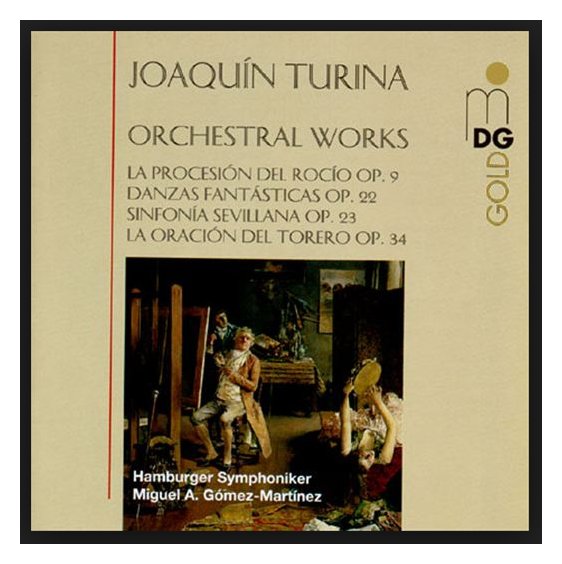 BD: In this first
concert did you find that the musicians respected you, or were they
more amused that
this was a seven-year old squirt on the podium?
BD: In this first
concert did you find that the musicians respected you, or were they
more amused that
this was a seven-year old squirt on the podium?
MAG-M: No,
because about ten minutes after
the beginning of the first rehearsal I discovered a mistake in the
score! They thought that I was really prepared to think as I
wanted, and they thought that my corrections were logical. It was
instinct, but they were logical things. When I corrected this
thing in the score, the resident conductor was red in the face and
said, “Yes! We had discovered
this but we didn’t correct it because it would show us in a bad light.”
But it was a real respect that I earned from the
musicians.
BD:
So when you were seven or eight years old, did you
want to conduct orchestral music or operas?
MAG-M: I
wanted just to conduct everything. It’s
like now — I like to conduct everything.
BD: Then how
do you balance your
career between operas and concerts?
MAG-M: At the
beginning wasn’t so difficult because I began in Germany, and in
Germany there are more
opportunities with opera than with concerts. So I started my
career conducting principally opera and not so much concerts.
But now I have corrected it and I have a real balance between one
thing and the other. It helps me also that
the Symphony Orchestra of Radio and Television in Madrid has made
me their principal guest conductor, so I have to conduct with it.
[Much laughter] But it is not only there. I am making
concerts
with all the orchestras all over the world. I came to Chicago
from the Staatskapelle in Dresden, which, as you know, is one of
the best orchestras in the world. Next I will go to conduct
the London Philharmonia. I have conducted both orchestras in
Madrid, as well as the Radio Symphony in Berlin, the Radio Symphony in
Munich, Bavaria...
BD:
Everything! You’re on your way, as they say. How do you
select which operas you will conduct, or which repertoire you will
conduct in the concert hall?
MAG-M: That
is in common agreement with management
of the opera house or of the concert hall. I like
very much when I am outside of Spain to bring Spanish music at the
concerts because I know pieces which are not only de Falla. That
is the only one everybody knows from Spain, but there are also
other composers such as Joaquin Turina (1882-1949) and Jésus
Guridi (1886-1961) who are
really worth the trouble to know. I try always to bring some of
these pieces.
BD: What
about Federico Moreno Torroba (1891-1982)?
MAG-M:
[Pleased that BD knew of this composer] Yes! I am doing now
in Madrid a new thing from
him. He died a few weeks ago and we are doing a first
performance.
BD: Another
one I always enjoy is Joaquín Rodrigo (1901-99)!
MAG-M:
Rodrigo, yes! And also
there is one with not a very Spanish name, Halffter.
Cristóbal Halffter (1930 - ), Ernesto Halffter (1905-89)
and Rodolfo Halffter (1900-87). Halffter is a
very German name, and they are all Spanish. It is a family.
Cristóbal is the nephew of Ernesto and
Rodolfo.
BD: I only
know Ernesto Halffter.
MAG-M: I like
him very much his way to compose, yes.
*
* *
* *
BD: You’re a
Spaniard, so let me ask about the Zarzuela. Is that the Spanish
opera, or the Spanish
operetta, or the Spanish musical comedy? What exactly is it?
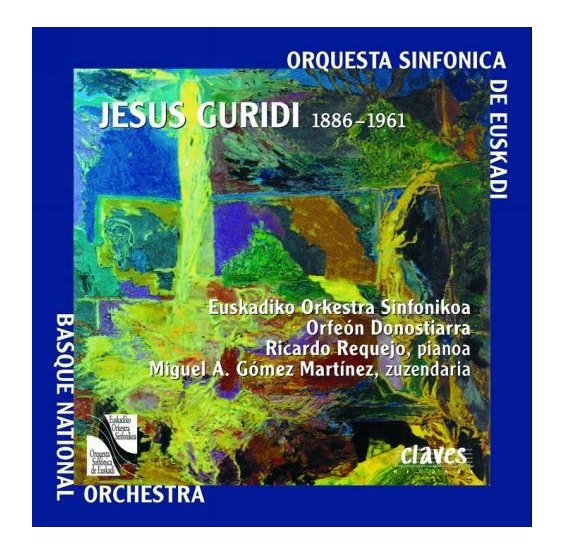 MAG-M: It is
something between everything, and you know
there are also Spanish operas. The Zarzuela is more between
a musical and operetta with very much things of opera because
the quality of the music sometimes can be compared to Verdi. It
is often very good, but not
every one. There are also very bad ones, but many of them
are very, very good. I’m thinking, for example, of Guridi.
Guridi
is one of the composers I named before, and he has wonderful
Zarzuela named El Caserio.
It is about Basquian
motives because he was born in the Basque land. This is very,
very interesting music, very folkloristic but really made well with
very good technical work and not very many
speaking places. That means it is, in a way, like
Zauberflöte or Fidelio, because it is also opera
with spoken text.
MAG-M: It is
something between everything, and you know
there are also Spanish operas. The Zarzuela is more between
a musical and operetta with very much things of opera because
the quality of the music sometimes can be compared to Verdi. It
is often very good, but not
every one. There are also very bad ones, but many of them
are very, very good. I’m thinking, for example, of Guridi.
Guridi
is one of the composers I named before, and he has wonderful
Zarzuela named El Caserio.
It is about Basquian
motives because he was born in the Basque land. This is very,
very interesting music, very folkloristic but really made well with
very good technical work and not very many
speaking places. That means it is, in a way, like
Zauberflöte or Fidelio, because it is also opera
with spoken text.
BD: Why have
Zarzuelas not traveled the world like the
operettas of Lehár and Johann Strauss Jr.?
MAG-M:
Yes. The contents of the Zarzuelas are very difficult to
understand if you
don’t know first the character of the
Spaniards. Second, if you don’t know exactly the language, there
are so many words with diverse sense, and one word can
signify the one thing and also another thing. You have to be
very, very strong in the Spanish language to
understand many of the things.
BD: Do they
not translate?
MAG-M: To
translate it, it would get lost. That is the thing, and that is
why it did not have the great success of the operetta. In the
operetta, even if you don’t hear the exact meaning of the word you can
take the sense of the thing because the human voice is used
another way. The Spanish character is completely different from
the
Austrian one, and the thing is that we understand each other very
well. I work very well with the Austrians and their humor, but
in another way.
BD: [Pursing
this just a bit further] So you’re saying you have to understand
the
character of Spanish people. Don’t you
have to understand the character of Spanish people to do Trovatore or
La Forza del Destino, or The Barber of Seville?
MAG-M: Not so
much. That is more the work of the
producer than of the public. When the public hears the
opera, they don’t think that it’s playing in Spain because they
are hearing the music and the beautiful voices. The Zarzuela
needs also the contents.
It’s not only a good singers and music, it’s all together.
BD: It’s more
dramatic?
MAG-M: Yes, I
find it so. There
are solutions in the Zarzuela where in every normal opera you would
have had a great finale, for example a great concertate for the
end. They don’t do it in the Zarzuela. They do it spoken
because they want everybody to understand very well what is
happening.
BD: Every
word???
MAG-M: Every
word, exactly. It is very good for the Spaniards but not for the
rest of the world because the rest of the world
would be much more helped [in the other forms] with the music.
BD: Do you
believe in any opera in translation?
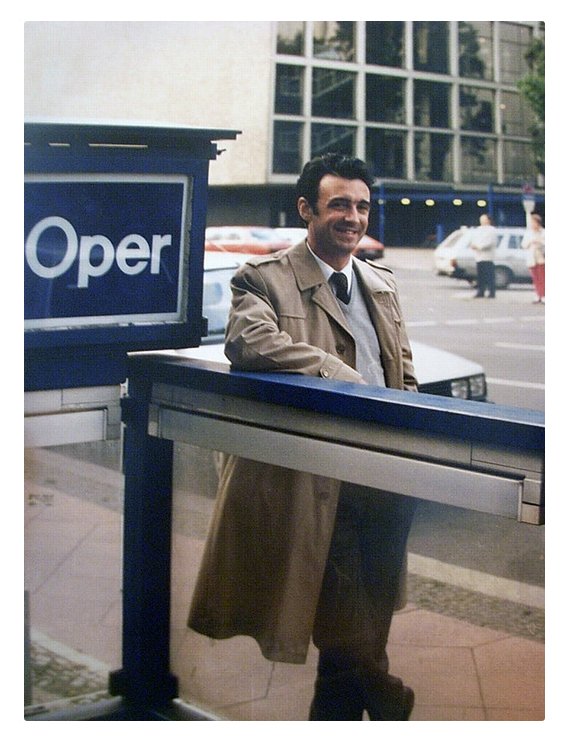 MAG-M: It is like a
sword with two
sides. Of course, if the public don’t understand exactly what is
happening on the stage, they will not like the opera so much as
understanding exactly everything. But musically I have to
distinguish between these two things. Musically the only way to
do the opera correctly is in the original language because the composer
chooses his melody for these words and exactly these words
with this movement and with these accents, and if you change it, it
doesn’t work.
MAG-M: It is like a
sword with two
sides. Of course, if the public don’t understand exactly what is
happening on the stage, they will not like the opera so much as
understanding exactly everything. But musically I have to
distinguish between these two things. Musically the only way to
do the opera correctly is in the original language because the composer
chooses his melody for these words and exactly these words
with this movement and with these accents, and if you change it, it
doesn’t work.
BD: You lose
something.
MAG-M: Yes,
sure, musically.
BD: You lose
more than you
gain by having everyone understand every word?
MAG-M: That
is what I don’t know. Sometimes in
several operas — especially in languages like
Russian or Czech or
something like these — I would prefer the
translation because only in
Russia or in Czechoslovakia would it be possible to understand
it. But many people can speak German. I would not translate
Zauberflöte into Italian
because they are very near
together. The Italians can learn German and also vice
versa. I would not translate
Trovatore or Nozze di Figaro into German, though
I have heard
it in German.
BD: But they
do those all the time in the smaller houses
in Germany and Austria.
MAG-M: Yes,
also the great houses in East
Germany. They do everything in German, and in Hungary they play
every opera in
Hungarian. It has to be terrible! [Both have a huge
laugh]
BD: So if
you’re invited to Budapest, you would not
conduct an opera there?
MAG-M: Well,
I can conduct any opera by Bartók
already! But I would not like to conduct
Tosca in Hungarian.
BD: Would
that make you nervous at all to
conduct Bartók or Kodály in Budapest?
MAG-M: Surely
not. I believe that music is rhythm,
and if you read the score exactly
with care and really all that is written there, you can play every kind
of music.
BD: [With a
gentle nudge] You don’t feel you are
too much of an upstart to go into Hungary to tell them something new
about their national composer?
MAG-M:
[Laughs] I don’t think
so. There are many people who go to Spain playing
Spanish music.
BD:
[Genuinely surprised] Really???
MAG-M: Yes,
and of course, they have it very difficult,
sure.
BD: Does it
work?
MAG-M:
[Hesitates] Sometimes yes. That depends on the
artistic quality of the person, very often. But
it is another thing, also. I am not afraid to make
Hungarian music because when I was a student I studied conducting in
Vienna, and I was playing in a restaurant at the same time to finance
my studies. I was playing
contrabass, my mother was playing piano, and
we had another colleague who was a Hungarian gypsy violinist.
I have learned so much about Hungarian character that we could say it
is my second musical country. I have used this knowledge very
much because at the start
of my career I conducted operettas of Emmerich
Kálmán (1882-1953), who was Hungarian. There were
many Hungarian songs in these
things, and Bartók is really Hungarian folk music, and I have
conducted
Bartók quite often. People say it is really one of my
specialties. I say all this
because it’s difficult. Bartók is difficult, really.
*
* *
* *
BD: Do you
enjoy modern music, contemporary music?
MAG-M: In
every kind of music there
is good music and bad music. I am not principally against
contemporary music, but I try to choose very well
the scores I conduct in these kinds. Sometimes I cannot choose
it. I have to conduct something that I don’t like because there
are
some compromises that you have to do. But normally I am careful
about making the selection.
BD: Would a
compromise like that be more of twelve
minutes on a concert program rather than a full opera evening?
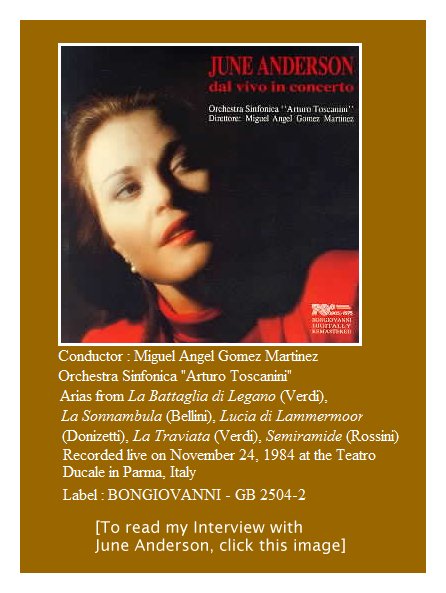 MAG-M: Sure,
sure! If I don’t like a
full evening in an opera, or a full concert with this kind of music,
then I don’t think I would do it.
MAG-M: Sure,
sure! If I don’t like a
full evening in an opera, or a full concert with this kind of music,
then I don’t think I would do it.
BD: What if
they asked you to do a premiere — whether it’s
good or not — on a program that is otherwise
acceptable?
MAG-M: Yes,
it depends on the rest of the
program. But principally I’m not
against anything because, like I say, it is only the history who will
tell who was the genius or not. I am sure at the
time of Beethoven and the other composers who are now very well known,
there were sure thousands of other composers who are not played now.
BD: At the
time of Mozart, Salieri (1750-1825) was a much bigger name.
MAG-M:
Exactly, and many others. Verdi has remained in the opera house,
and how many
other people have composed opera at his time?
BD:
Sure. Is there a reason now to do operas by Mercadante
(1795-1870) and Salieri and some of these others?
MAG-M: [Sighs]
BD: Or is it
better to leave them on the
library shelf?
MAG-M: I
would say they have a moment, a
scientific interest because you see how these people can have
composed. You see the difference with the great genius and the
not so great genius. But to make it as repertory
operas, I don’t think this is very practical because the public is not
so interested that in scientist’s work. They want to hear real
good music, and so good music is better. And the better the
music is, the better they will like it.
BD: Should we
always do masterpieces?
MAG-M:
Principally masterpieces. Of course,
sometimes we have to show the others so that they can also make the
difference.
BD: Will the
audiences appreciate the masterpieces more?
MAG-M: Sure,
sure! I have found it always so.
When I conduct any concert, a good piece beside a not so good piece,
the good piece has much more success, and I don’t think it is
just because it was a very well-known name. For example, about
one year ago I did in
Madrid something by
Menotti.
Menotti’s not very well known in Madrid. It was
only the second work by him they played in Madrid — The Death of the Bishop of Brindisi.
Do you know it?
BD: Yes, it’s
a cantata.
MAG-M: It’s
an operatic work, though its
under-title is Cantata in some scores, yet in others it is an opera for
a mezzo-soprano, baritone, children and
chorus and great orchestra. It is very beautiful and I
like it very, very much. So I did it, and it was a great, great,
great success. They didn’t know Menotti, but it doesn’t
matter. They like good music.
BD: Would
that kind of a work do well here at Lyric Opera of
Chicago?
MAG-M: I
think so, but it’s just
a little unpractical because it’s only thirty-five minutes, and you
have to put another piece with this, sure. It is
very big. You need a very great children’s chorus. The
chorus here is wonderful and the orchestra’s wonderful. That is
no problem. It is just the children’s chorus that I don’t
know. But I have seen in the program the list of the names, and
there are not as many as you need because you have to have a
very large children’s chorus. If not, you will not hear
them because the children are singing to
you in the storm, and in the storm is the orchestra very, very
loud. All the orchestra is playing with very great
percussion. So if there are not about 100 children, you will not
hear them.
BD: Have you
done concert operas — operas in the concert hall?
MAG-M: I have
done pieces of operas in
concert halls, and I agree with this.
BD: Would
complete operas work as concerts?
MAG-M: It
works, especially if it is an opera in
places where you don’t have the possibilities to make it real with the
scenery, because opera is theater and you need the stage.
But if you don’t have the possibilities on stage — because
maybe the
stage is very small and can only put the people inside so that they
can stand and sing — it is better than
nothing. That is
what I mean. In this sense, I would do operas concertante. Also in the
sense you see a really interesting piece that you don’t have the
opportunity to
put on the stage, like this Menotti for
example. That is really worth to make it just in concert.
*
* *
* *
BD: When you
study scores, do you ever listen to
recordings?
MAG-M:
No! After, yes, but not during. The first thing I try to do
when I study a score — even if it is a very
well-known work — is to forget all of what I
heard
about this work. I just read the score and I do what is in the
score.
BD: Do you
read the score at sight, or do you play it at the piano?
MAG-M: No, at
sight. The first thing I think is that the composers are
really genius. I am not a genius; I am a reproducing
artist. If I was a genius as great as Beethoven or Brahms, then I
could compose such wonderful works like they
did. I cannot.
BD: Have you
composed any at all?
MAG-M: Yes, I
am a composer but I don’t think I am a
genius. [Has a huge laugh] Maybe I am a good composer, but
not a genius, surely not. And because I don’t believe that I am
like Beethoven or Brahms, I don’t believe that I have to correct
them. They tell very well what they wanted, and I am not the
person who
has to correct these things they wrote. I have to do what they
wrote because they are much more intelligent than me and every other
person who is there sitting, playing or conducting, or
listening. The very intelligent person was the
composer, so we have to respect him.
BD: You say
you don’t correct Beethoven or
Brahms. Do you correct Verdi or Puccini?
MAG-M: Also
not because I don’t correct any
composer. If he is a real genius he doesn’t need my
help, and if he’s not a real genius he’s not worthy of my help.
[Both have a huge laugh] That is the point of view I learned at
the
Vienna High School. Hans Swarowsky was my conducting
teacher, and it is not from me that I say this. He said it already for
me. There was a concerto for piano and orchestra (I forget by
who) and it was very bad piece. We had to conduct a passage from
it, and a colleague of mine
conducted it a little faster. Swarowsky said, “No,
no, no, don’t
conduct it faster! You have to make the people notice how bad
this piece is!”
[Another huge laugh]
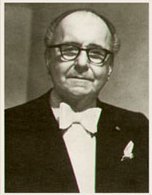 Hans Swarowsky (September 16,
1899 – September 10, 1975) was born in Budapest, Hungary. He studied
the art of conducting under Felix Weingartner and Richard Strauss. His
teachers in musical theory included Arnold Schoenberg and Anton Webern. Hans Swarowsky (September 16,
1899 – September 10, 1975) was born in Budapest, Hungary. He studied
the art of conducting under Felix Weingartner and Richard Strauss. His
teachers in musical theory included Arnold Schoenberg and Anton Webern.
Herbert Karajan invited him to take on the permanent position as
conductor of the Vienna State Opera.
He became a professor of conducting at the Vienna Music Academy. His
many conducting students included Claudio Abbado, Zubin Mehta, Leonid
Nikolaev, Paul Angerer, Ádám and Iván Fischer, Jesús
López-Cobos, Gustav Meier, Giuseppe Sinopoli,
Gianluigi Gelmetti and Bruno Weil.
Swarowsky's lectures and essays were collected into the publication Wahrung der Gestalt (Keeping
Shape), which today serves as an encyclopaedia for performance and
conducting
|
BD: Are there
some pieces that are generally regarded
as being poor pieces that you feel are much better than their
reputations?
MAG-M: I have
to think about that... Sometimes, yes. Not many but
several, especially in the mind of
people who are not professional. That works also with the quality
of artists and everything. You’ll not always agree with
the things you heard about people, and I think it is good because you
have to build your own opinion. The art is
so subjective that you can have thousands of different opinions, and
all can be right.
BD: When you
pick up a score that
you know is not a first-rate masterpiece — maybe
it’s just a little
below the first-rate masterpiece — do you work a
little harder to show
it off to its best light?
MAG-M:
Sure. I try always to keep the light on to be advantageous.
BD: If you’re
conducting a Beethoven
symphony, there’s not too much you can do to really destroy it.
MAG-M: Oh,
yes. To destroy it is impossible because the
piece is already known. It sells so well that nobody can
destroy it. But I have heard very often — even
from famous
conductors — versions of Beethoven and Brahms
which have
nothing to do with that what the composer wanted. There was, for
example, a very, very famous conductor — whose
name I don’t want to say
now — who conducted fourth movement of Seventh Symphony by
Beethoven faster than the third movement. He was a qualified
conductor, and he had not seen that Beethoven wrote
his metronomes. The metronome in the third movement is 132,
and in the fourth movement it’s 144. You can discuss if this
metronome
by Beethoven was faster or slower than any other metronome, but in any
metronome 132 will be slower than 144! He made a mistake.
BD: Do you
ever make mistakes?
MAG-M:
[Laughs] Sure! I am sure I make them. I am
learning always. Many people say I am
young and will get very great experience. It is true that I have
the
great experience already. I am twelve years a conductor
already, but I have the experience of a normal conductor of
forty-five years. I became very soon okay, but I don’t think I
have enough experience, and I don’t think I will have enough experience
when I am seventy because you are always learning, always, all the time!
*
* *
* *
BD: Do you
ever come into conflict with the stage
designer and the stage director?
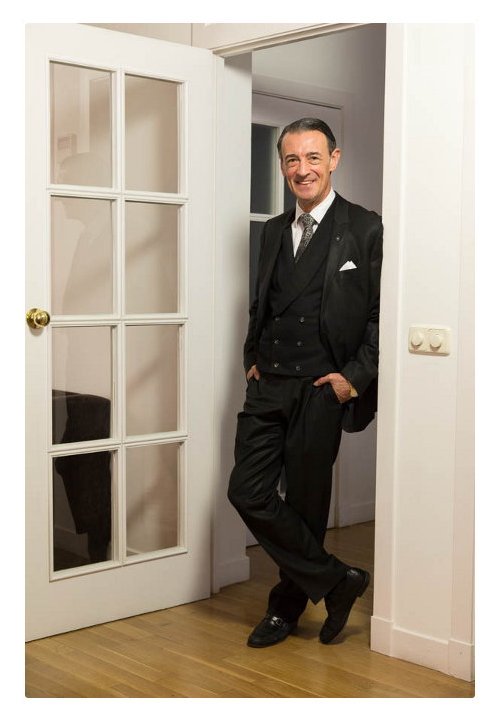 MAG-M: Not here in
the U.S., and not in England, but sometimes in
Germany and Switzerland, yes.
MAG-M: Not here in
the U.S., and not in England, but sometimes in
Germany and Switzerland, yes.
BD: Who has
the final say — you or the stage
director?
MAG-M: Until
now I had it always. I don’t like to
discuss and I don’t like to fight, but if I must I have to, and
normally I get to convince the people about the things I cannot
settle for. Of course, there are many things you have to accept
because
if you come to a new production and you find a set that you don’t like,
you cannot say, “This set has to be broken and
we must make a
new one.” You cannot say it. You can
say, “I won’t
conduct this production,” but you cannot leave
the people there when you
arrive one month before the first night. You cannot say, “I
won’t do this so now I go away,” because the
theater would
have problems to get another conductor to be there all this time.
So
you have to accept this.
BD: Do you
change more when you are working on new productions rather than
established productions?
MAG-M: Sure,
because you can give ideas and
experiment. The greater the producer is as an artist, the more
ideas he accepts from singers and from the conductor. I have seen
it every time. Really, the greatest producer
accepts more ideas than the one who thinks he is very
great.
BD: Do you
approve when a producer tries to update
things? For instance, there was recently a Rigoletto that
put the opera into 1950s in the Little Italy section of New York and
made it a
‘mafia’ thing. Does this work? Is this good for opera?
MAG-M: I
don’t think so. If you make a copy of Mona Lisa, you have to depict Mona
Lisa. You cannot put on a mustache. It would not be
correct.
BD: [Gently
protesting] But the Mona Lisa
you see is a static
thing. It is there and that’s all, whereas opera, as you
indicated, is a reproducing medium.
MAG-M: Yes,
but you can also engage someone like Penderecki and
say, “Make an opera with the theme of
Rigoletto.” Then Penderecki will do modern
music on that
theme, but it will be very much modern in this time in all these
things, etc., etc. Okay, wonderful! But with Rigoletto by
Verdi, composed in the nineteenth century, and with a context in this
time, that has to be in this time because if it is not, you
change the character of the opera, even if the music unchanged.
Even if the music doesn’t change, and the public
gets another impression. This is completely different from
what you expect from the Duke of Mantua. You cannot
change the name of the Duke to the Count if Mantua, and you should not
see the Duke of Mantua with the jeans, or Aïda like they did now
in Frankfurt where she is
a Putzfrau [charwoman or
cleaning lady].
BD: Suppose
they call you up and want you
to conduct this production of Aïda
in Frankfurt. Will you come?
MAG-M: No,
no.
BD: You’d
just turn it down?
MAG-M: That
is correct. If they engage me to conduct
this Aïda, I will
not. I did La Forza del Destino
in Orancia, which was set in the year 1935. This is also wrong,
but I didn’t know
it until I was there. When I was there I couldn’t say what
I just told you now, and I couldn’t leave because the time was very
short. It was just two weeks before the performance.
BD: This is a
question I like to ask singers, but
it would be interesting to get a conductor’s reaction. How
difficult is it for you to say ‘no’?
MAG-M:
Difficult! I like to work. I like
very much to work and that is why at the beginning I was doing so much
opera. I began to get my name in opera, and everybody wanted to
have me. I wanted to do
everything, and I went to every place, and so when offers for concerts
came I was already occupied. So now I am taking it a little more
deliberately, and now I begin to say no even if I would like not
to.
*
* *
* *
BD: Are you
good audience?
MAG-M: Yes,
well... I don’t know. [Much laughter]
BD: Do you
ever go to the
theater when you’re not performing?
 MAG-M: I
go. I don’t go very often because when I
am not performing I am normally preparing other things. But when
I go to other performances, then I suffer
sometimes because I am feeling with the problems which are
happening there. In every performance there are
mistakes, and being a conductor there are things that you have to
correct. If I am conducting, I don’t care because I know I will
correct it anyway. I don’t know how, but I will; but I don’t
know if he
will. I am sure he will, but this feeling is difficult to
explain.
MAG-M: I
go. I don’t go very often because when I
am not performing I am normally preparing other things. But when
I go to other performances, then I suffer
sometimes because I am feeling with the problems which are
happening there. In every performance there are
mistakes, and being a conductor there are things that you have to
correct. If I am conducting, I don’t care because I know I will
correct it anyway. I don’t know how, but I will; but I don’t
know if he
will. I am sure he will, but this feeling is difficult to
explain.
BD: So there
is tension for you?
MAG-M: Yes,
sure, and I am hoping that it doesn’t happen, and that he can make it
as good as possible.
BD: Have you
ever been to a concert where you’ve found another conductor has done
something and it’s a revelation?
MAG-M:
No! I
found sometimes performances where I learned many things about how to
get results. About
interpretation it is difficult because I am missing some times many
things that are written, or I am hearing things which are not written,
and that I don’t like. You can ask me if everybody would be like
me there would
be never a difference between two performances, but it is not true
because allegro is allegro. It is
fast, but not so fast because even if you have the
metronome number, metronomes have differences between among them.
100 can be a little faster or a little slower.
BD: If you’re
a little more agitated the afternoon before the performance, is your allegro a little faster?
MAG-M:
Maybe. I personally am not very
influenced because in Vienna they have control of the
duration of the representation of the performances of each opera, and I
could control easily the differences between the length of the
acts. When I was conducting an opera, there were never more
than two minutes difference, and this is a very short difference for a
piece
of about one hour. And it can be because of applause or because
of other extraordinary circumstances. But it is, of course,
possible that you can be a little faster or a little slower. That
is change also.
BD: In the
course of a
run of performances your difference is only a minute or two. But
what about the timing of a piece in 1982 as opposed to the timing of
the
same piece in 1974 or 1996?
MAG-M: That
doesn’t change very much — at least until now
because I work with a system that makes me not be able to change the
tempos very much because I work with
the relationship between with the tempos.
BD: You don’t
feel constricted though because of this?
MAG-M: No, in
the opposite way. It is real, and
you don’t have to think how fast I have to take this
special passage. No, you take one tempo and
then you are not concerned about any other things. Of course,
there are some times... Puccini doesn’t work because Puccini is all
rubato. But there are
other ways to control these things.
BD: Beethoven
has allegro and Puccini says rubato?
MAG-M:
Puccini says allegro, and two
beats later says poco ritardando,
and three beats later he will say accelerando
ancora! [Lots of laughter] That is the thing.
On very, very rare times, Beethoven writes ritardando or something
like this, and he’s very precise. Beethoven is very, very precise!
BD: When
you’re in the pit, how much do you
watch the singers and let them breathe a little extra?
MAG-M: All
the time. You have to take care of
them. You have to take care of the very people who are making
music. You’re not making music, you are just conducting.
That is another thing — you don’t sound.
The conductor
doesn’t sound. Every other person is sounding, and they need your
help. That is all. That is what I see.
BD: Are you
more flexible in the opera than
in the concert hall?
MAG-M:
Sure. In the rehearsal work of the
opera or the concert, you have to make sure that the singers, the
soloists and the musicians will do what you want. Then comes the
performance, and it can happen so many accidents. There you have
to
be flexible because they will do what you want — the
singers, the musicians, they will do what the conductor wants.
BD: As much
as they can?
MAG-M:
Exactly! There are also
accidents. Something can happen and they can make mistakes.
We are all human, and if they a mistake you have to help
them. If they have an accident you have to help them, and you
have to be flexible.
BD: Is this
the problem with the recording — that it’s not
human?
MAG-M: I
think so, but not because of the
flexibility. It is just because of so many repetitions. You
take a piece of music — about two
minutes — and you repeat it for about one hour
so that it is
perfect. Of course that cannot have life. That is dead
music, but
it necessary.
BD: Are
recordings, then, going to be the death of music?
MAG-M: No,
sure not. There is another thing... it is just that the people,
the audience, the public have now a different
idea of what music really is because when they are hearing the
soloist on the record, they will hear the soloist very well because of
the microphone for soloist. If he’s covered by the
orchestra...
BD: ...the
engineers turn the knob!
MAG-M:
Right! They turn the button and it sounds
more. It is exactly the same is the opera. The orchestra
will be
fortissimo and the singer will
be heard very well. In the
theater it’s not possible because when an orchestra of eighty
plays only forte, they cover
already the singers. You have to take
a very great care of this always. It’s very difficult.
BD: Do you
ever find yourself covering singers?
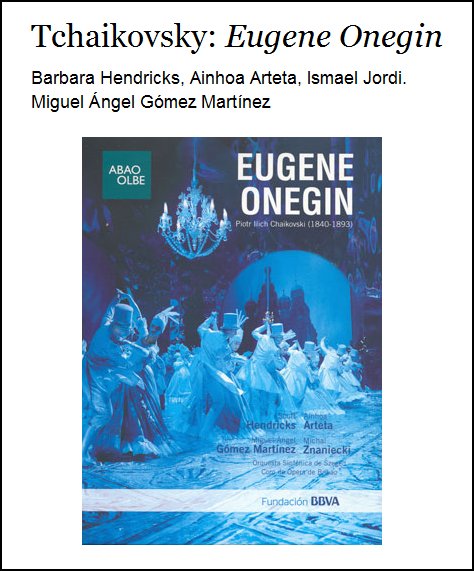 MAG-M: Yes, sure
— not very much in
performances, but in rehearsals very often. I’m always asking the
orchestra to play less! It is really difficult to get this
balance, very, very difficult. You cannot hear a real forte when only one
singer is singing.
MAG-M: Yes, sure
— not very much in
performances, but in rehearsals very often. I’m always asking the
orchestra to play less! It is really difficult to get this
balance, very, very difficult. You cannot hear a real forte when only one
singer is singing.
BD: Might
there be a time when a singer
is having vocal trouble so maybe you would let the orchestra cover them
a little bit more?
MAG-M:
Sometimes, yes, and not only this.
Sometimes it is very difficult for the singers to hear the
orchestra from this distance. Now they put a
loudspeaker on stage and they hear it better, but
sometimes when we make really pianissimo
they don’t hear
anything, and it can cause a change of the pitch.
They can make a mistake and be too sharp or too flat, and then in this
moment you have to let somebody play stronger so the singers
can hear it.
BD: How
closely can you signal the singer?
MAG-M: Quite
close, but I don’t like to do so. I
don’t like that kind of signaling to everybody.
BD: Is that
more the job of the prompter?
MAG-M: I
always work as if it would be no
prompter. I am singing with the singers. I am giving them
the text when they make a mistake. When they don’t know what to
sing
and they look to the prompter, I am prompting also.
BD: Does it
bother you if they’re looking to the side or into the prompt box rather
than to you?
MAG-M: Oh,
they are. Even if I am looking
there [glances away], I am seeing you very well! They don’t
lose us from their eyes, even if they are looking away.
BD: Yes,
their peripheral vision. Have you ever worked
in a production where they’ve used a scrim?
MAG-M: Yes,
often. That doesn’t
disturb if you have good singers. That shouldn’t be a
circumstance for me to say, “I don’t like this.”
BD: Can you
see them clearly, and can they see you?
MAG-M:
Normally yes, if the lights are good. The first thing when I see
one of these scrims is to ask how the lights are, and when the
lights come the first thing is to ask if the singers see me.
Usually it is OK, but if
not, then I ask to change the lights! That is really
something very important. We also have the monitors.
Today the theater has many advantages of technique. If they don’t
see me directly, they have the monitors and they will see me on
television.
BD: Is the
television monitor better than an assistant
conductor?
MAG-M: They
have an assistant conductor also.
BD: It used
to be that the assistant conductor would
stand in the wings and would watch the conductor.
MAG-M: Yes,
that was once. Now that doesn’t exist
anymore because of the television. The assistant conductor will
be there. He will look at the television and will conduct because
if the singers look directly to the television, they will
be too late because they are too far away. The assistant
conductor has to conduct a little before me. I know it
because I did it also when I started my career.
BD: It’s sort
of like playing double bass.
Doesn’t the double bass have to anticipate the beat just a little so
that it can sound at the right time?
MAG-M:
Sometimes, yes, especially because they are
also very far away always, even here because it is a very unusual
seating of the orchestra. At the opera is normally that you have
the woodwind left, and on the right the brass.
But the horns are with the woodwind, and this is the normal
way. Here it is also for the wind, but not for the strings.
[Points here and there to indicate where the various instruments are
placed in the pit] The beginning of the rehearsal was
terrible because every cue for the violins were for the
cellos! [Huge laugh]
BD: You’re
always pointing the wrong direction.
MAG-M: Yes, I
was always changing the direction in the
last moment.
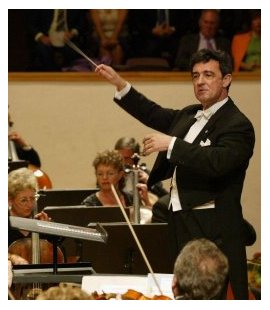 BD: Did you not
want to reseat the orchestra?
BD: Did you not
want to reseat the orchestra?
MAG-M: No, I
don’t like this because there
are little differences in every orchestra, and they are used to where
they are seated, and they take their cues from the instruments that are
sitting near them. So if you change the seating order they don’t
feel comfortable. If I don’t feel very comfortable, I have to get
used to it very quickly, and it is easier for me to do that. The
first time I conducted in Vienna, it was for me a really
big surprise because their seating arrangement is also different from
the one I was used to [Indicates that the second violins are on the
right, rather than the cellos].
BD: Real
stereo! [Both have a big laugh] You’re a double bass player?
MAG-M: No, I
am a pianist.
BD:
[Surprised] But you said earlier that you played double bass in
that restaurant.
MAG-M: Yes, I
played also the double bass and I
studied violin. I was never a good violinist.
BD: I thought
you were like Zubin Mehta who was actually a
double bass player.
MAG-M: No,
that not, but I arrived to play very
good, quite good double bass. I have also a funny story
about this. We were rehearsing Le
Nozze di Figaro with the
Vienna Philharmonic, after a break a couple of the string players were
playing others’ instruments! When the
first violin saw that, he went to the double bass
and took that one. So almost everyone changed their place!
BD: String
players can do that, but you can’t easily change the winds.
MAG-M: No,
no, but they did it in the strings, and it
sounded exactly as if nothing would have happened. It was very
good, and I continued my rehearsal. It was for singers, not for
the orchestra. As we continued the rehearsal, the concert master
— who was then playing the double bass — said
to
me, “Maestro, don’t you play any orchestral
instrument? If so, I would
like to conduct!” I said, “Please
come here and give me your
double bass.” So he came to conduct and I
played the double bass
with the Vienna Philharmonic! I have been a member of the
Vienna Philharmonic! [Gales of laughter]
BD: I would
think that especially with an opera like Figaro, which they play so
often, this would be something that would revitalize them and make it
more interesting.
MAG-M: Yes,
and it was easy for me to change
many things because many of my colleagues were doing things which are
not written. I just had to take away all the traditions,
and it was a change.
BD: Did they
like that?
MAG-M: Oh
yes, they did it without any resistance, and
they congratulated me for having made the things like they were
written. I was very happy about this because the
Vienna Philharmonic is a very good orchestra.
*
* *
* *
BD: When
you’re preparing
yourself for Le Nozze di Figaro,
do you go back and read Da Ponte and
Beaumarchais, and the letters between Mozart and his father? Does
these all have an impression on you?
MAG-M: Sure,
sure. It is always interesting. It is a part of conducting
also to be inside of the life of the
composer when he was composing this piece, and to know generally about
the time which surrounded the composer. It is also very
interesting to know how they played this kind of music
because, as I said before, I just had to take all the
things are not written and take these
traditions away. I need the best traditions because the good
traditions you have to know. You that in a fermata by Mozart
was also a cadenza, and there was something that the singers had to
do. You have to keep these traditions, and that is a good
tradition which nobody does now. Almost no singer wants to make a
cadenza
there, but they have to!
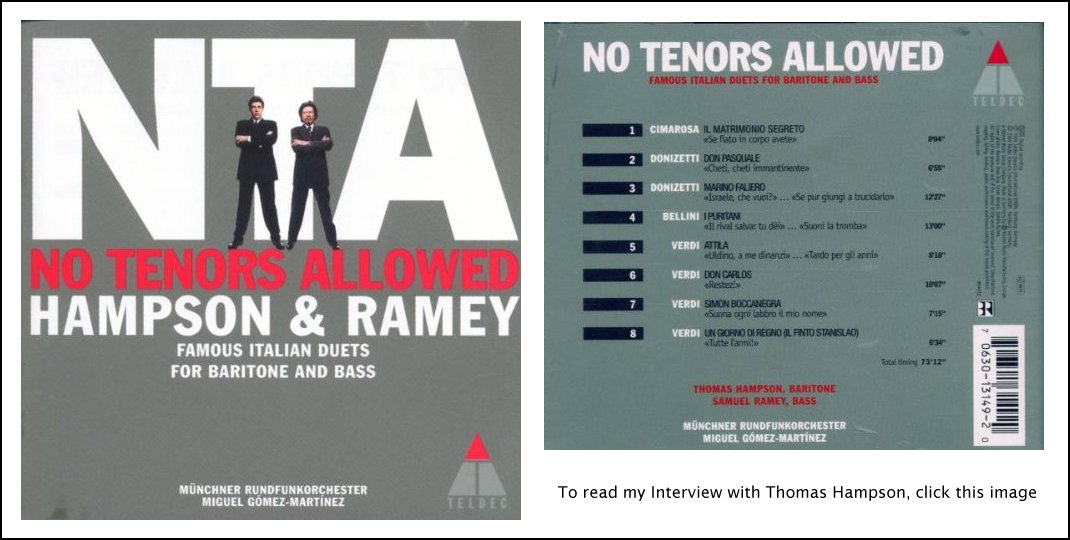
BD: Are the
singers
afraid of it?
MAG-M: I
don’t think so. I think it is more their
comfort. Mozart didn’t write it, but they have to do it. I
don’t
know, really. I didn’t make a study of these things, but it would
be interesting to know why they don’t do it, because there in Mozart
they have opportunity to do it. Of course it must not be such a
lengthy
cadenza, but a small cadenza they have to do, yes!
BD: Do you do
any earlier works such as
Handel or even Monteverdi?
MAG-M: I try
not to do it because they are real
chamber music works. I would do these works when I sit at the
cembalo and conduct from the cembalo, but I find it a
little ridiculous to put the conductor for eight or nine people in this
kind of music because if they are good musicians, they
don’t need somebody who is beating time. At this time period,
there
was not the figure of the conductor.
BD: Going the
other direction, have you done
some Wagner?
MAG-M: I have
done Wagner in concerts, but not on the
stage. I have done parts from Meistersinger,
Tannhäuser...
BD: Overtures?
MAG-M: No,
no, also arias and concertato
pieces, but only in concert, not on stage.
BD: Will you
do some on stage?
MAG-M: Oh,
yes, I would like to.
BD: You like
the music of Wagner?
MAG-M:
Yes. I like it and I feel good hearing and
doing it. I feel also very good with Richard Strauss.
BD: Is there
a relationship between Wagner and Strauss?
MAG-M: No, I
don’t think so. The
relationship is the language, of course, and they are both German
mentalities.
BD: Let me
change the question. Is there a
development from Wagner to Strauss — a direct
line, or a
lineage?
MAG-M: I
don’t think so. Strauss is
another kind of musician, completely different. Wagner is more,
we could say, the lyrical one, and
Strauss is the dramatic one. I would compare Wagner to Verdi, and
Strauss to Puccini. In Verdi very often you are seeing on stage a
very
dramatic situation, and you are hearing
waltz music. I don’t want to
make a sacrilege, but something like this sometimes happens in early
works of Wagner. That will never happen in Strauss because in
Strauss is like in Puccini — you hear in the
music what is happening there
on stage.
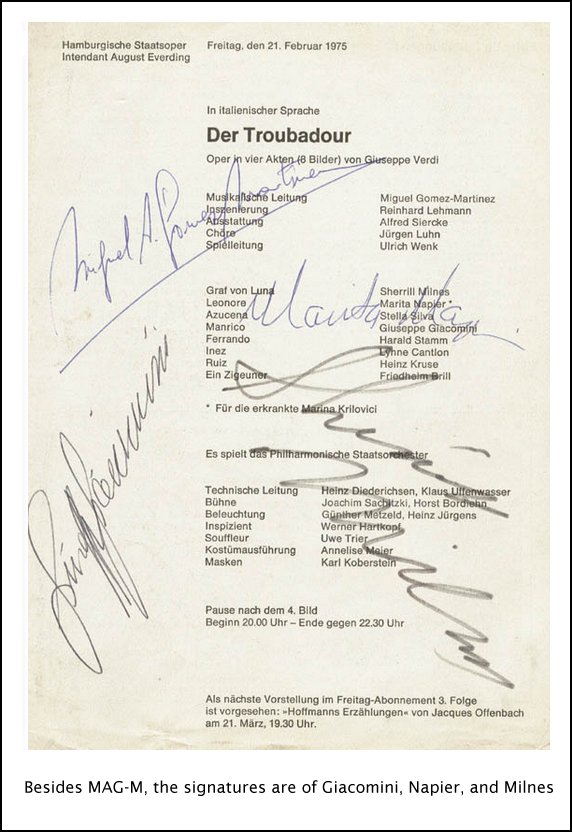 BD: Is it a mistake
of Verdi that you don’t
hear from the pit what you see on the stage?
BD: Is it a mistake
of Verdi that you don’t
hear from the pit what you see on the stage?
MAG-M: I
would not say it is a mistake; it is the way in his time to
compose. You can see very well in Verdi that this is the way of
the
time because in the early Verdi works this happens very often. In
the
middle Verdi it happens not so often, and in the late Verdi it doesn’t
happen.
BD:
[Pretending to be shocked] So Verdi was
growing???
MAG-M:
[Laughs] Sure, and it was also the time
changing. Think of the
situation in the last act of Trovatore,
when it’s a very dramatic
situation and you’re hearing a waltz! The others are singing
also, and they
are singing a terzetto.
It is not very
dramatic. We would say it is very dramatic because it is the
intention there, and it depends, of course, how it is sung, but I think
it is a very funny thing. If you have good
singers, it will always be dramatic, but it is not the
real relationship. On the other hand, in Puccini, if
you take away the text, you know the context of the piece. You
can make out precisely in which
part of the work you are hearing this kind of music. That you
cannot do with Verdi because if you take the text out of Verdi and you
hear [demonstrates a typical rhythm], you can be in Traviata, in Rigoletto, or in Trovatore. That is what I
mean. It’s not
that it is better or less or worse, it is just that it is different,
and it is the difference which I find also
between Wagner and Strauss. Not so crass, not so intense as
between Verdi and Puccini, but a little bit the same.
BD: Are there
any great operas that you have not done
that you are looking forward to doing?
MAG-M: Great
operas? I would like very much to do
Manon Lescaut. I would
like very much to do Rosenkavalier,
but I
never did until now. The Ring...
BD:
[Surprised] You want to do the Ring?
MAG-M: Yes,
with time, little by little, all four!
BD: Should
the Ring be done one opera
per year, or
should it only be done in a week?
MAG-M: I
would prefer to see it in a week because you
can get a context of the whole thing. But it is very difficult
because it
is very hard for the orchestra and for the singers and for the
conductor.
BD: Many of
your responses show that you think like an administrator. Are you
Music Director anywhere?
MAG-M: No.
BD: Would you
ever accept that kind of post?
MAG-M: That
would depend. I don’t like to
say no to anything because some really important affair might come
along.
I have already had several important offers, but I think it would tie
my hands. You feel yourself tied to this one house, and you
have to be in this house because if you are not there, you are not
doing well in the job of Music Director. So I prefer to be a
little more free, and that means until I am offered a very special
position that would be worth it to remain there a
long time, I would not accept such a position.
BD: Do you
like traveling?
MAG-M: Yes.
[Laughs] If not, I couldn’t do this
job!
BD: Because
you wind up being six weeks
here, six weeks there, four weeks there and so forth?
MAG-M: Six
weeks is very much because normally three
weeks is already enough time.
BD: Really???
MAG-M: Yes,
because normally here in America you
have the staggione
system. There are rehearsals and then come the performances, but
during
the performances are days where you are free. In Europe you
have the possibility that when you have made the production, between
the performances you can go and conduct in another place. That
means three weeks of rehearsals, the
first performance, and then you go away and return.
BD: So you’re
going back and forth!
MAG-M:
Exactly.
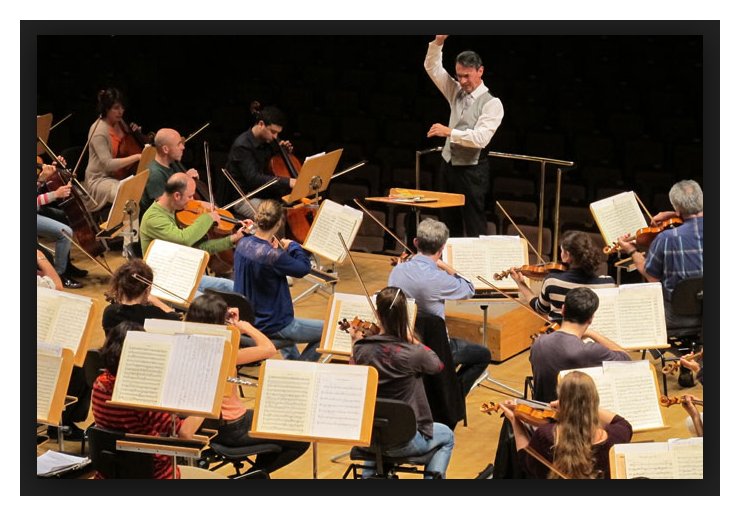 BD: Is that not too
much? It would have to mesh perfectly in order to work.
BD: Is that not too
much? It would have to mesh perfectly in order to work.
MAG-M: Yes,
and that is the work of the manager to take exactly all the time we
have. I don’t like to conduct very, very closely.
BD: Be in
Munich Monday, Wednesday, Friday, and Frankfurt Tuesday, Thursday,
Saturday!
MAG-M: Yes,
that would be terrible! [Hearty laugh] Once, because of
difficulties of theaters, they didn’t
have conductors. Somebody canceled because he was ill, and the
others
were not available. I had to conduct
in Berlin Don Giovanni, in
Munich Trovatore, and the
next day and the
following day in Hamburg Masked Ball,
or something like
this. That was really a little record for me, and I don’t like
to do this. I really don’t like it.
BD: It’s too
much?
MAG-M: Yes.
BD: A
conductor can get away with that kind of thing,
but a singer can’t.
MAG-M:
Yes. The singers have to use an
instrument which is very delicate. The arms are not so delicate!
BD: Do you
take that into consideration, perhaps? If
you were working in one opera house and knew that a singer is doing
another production elsewhere, going back and forth, and back and forth?
MAG-M: We
have to take care of these things, yes, that’s
true, and we have to help them.
BD: You would
not ask them to cancel?
MAG-M: I am
not able to do this because I am not Chief Conductor of any
house. When I have to conduct an opera, I have
to agree with the cast — or not — but
I don’t know if he will sing in
another place the day before. Maybe it happens, and maybe
somebody’s ill and somebody else has to replace. You
have to understand it also. But it is very exciting also to have
different artists, even in the
same piece. I am now thinking about this situation here with
another tenor. You have to take the advantage of this new
tenor and forget the advantage of the other tenor because they are
both very good. The one has things that I would prefer to the
other, but nobody is
complete.
BD: Do you
find that you have to change emphasis here and there,
and bring out and maximize the good points?
MAG-M:
Exactly, exactly, and that is the thing
which makes this work very exciting.
BD: But you
wouldn’t want to change it every couple of
nights?
MAG-M: No,
no, no! When I do a production I prefer
that it remains the same cast. It is much more
sure for everyone — especially the people who
are singing because the
other colleagues would have to adapt themselves to the different
production.
BD: Is there
ever a case when you do too
many performances — maybe fifteen or twenty
performances with the same
cast, and it gets boring after a while?
MAG-M: If
they are good artists they will not become
boring, and I will not because we will look always for the way to do it
better.
BD: If you
have a cast that maybe is not paying
attention, or is just a little bit down from a previous performance,
will
you do something to catch their attention?
MAG-M:
Sure. First, they
will notice that I will be much more attentive to several of the
details we have made before. And then I will say, “Be
careful today. We are not like we should be!”
BD: [With a
mock scream] “Wake up!”
MAG-M: [Huge
laugh] Of course I don’t like to scream. I try
never to do that. You can get more things
if you say everything quietly and with love and good manners than if
you [also makes a mock scream].
BD: [With a
gentle nudge] You don’t want to be dictator?
MAG-M: No,
no, no, absolutely not, no, no. I am
very happy when I have a good atmosphere and we can work, because I
think work is a group of friends who are making a very great
thing — music — and if we
are all friends it’s the best
way. There is casually a friend who has to determinate how the
thing has to be, and that is me, but it’s the only thing.
*
* *
* *
BD: How does
this house here in Chicago compare with
other houses acoustically and visually?
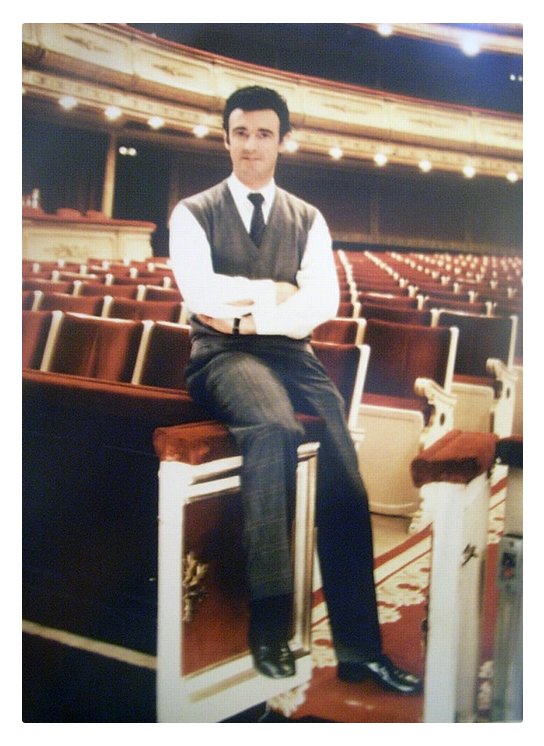 MAG-M: Visually it’s
wonderful, not like all the
old-fashioned theaters of horse-shoe form where many of the
people who are sitting on the sides cannot see. Acoustically I
don’t know how it is in the audience hall because I was so busy
that I couldn’t come to any other performance. I will come to one
of the student Butterfly
afternoons because I am interested and I want to hear one of
them. So I
will see how the acoustic is then.
MAG-M: Visually it’s
wonderful, not like all the
old-fashioned theaters of horse-shoe form where many of the
people who are sitting on the sides cannot see. Acoustically I
don’t know how it is in the audience hall because I was so busy
that I couldn’t come to any other performance. I will come to one
of the student Butterfly
afternoons because I am interested and I want to hear one of
them. So I
will see how the acoustic is then.
BD: Where
will you sit? Will you
try to sit in the fifth row, or in the balcony, or in a box?
MAG-M: I like
to sit in the middle of the house,
more or less, so tenth or eleventh row, but I will take the ticket
that they give me. The acoustic here, as in
every other theater with the exception of Vienna, is bad for the
conductor
because we hear very much the orchestra and not very much
singers. It was a real problem at the beginning. The
entrance of Butterfly was a great problem. I remember the first
time I rehearsed it with the orchestra and the chorus
and Butterfly, and when I finished the scene I asked the people behind
me if they had heard something from the
chorus because I didn’t hear anything. They said the chorus
is too loud! We fixed it, but still now in the performances I
don’t hear the
chorus. I just know that they are singing, and I know that they
are together with me because I look, and I see how they are
singing. That is the only control I have. [Laughs] It
is comical, but in this scene it
is so. There are several things I can only control by looking
because hearing is impossible. Of course, when Butterfly
stops singing and the orchestra is very soft, then I hear the
chorus. It’s not the full passage, but several places
which are difficult because there is rubato and I would need to hear.
BD: What’s
the role of the critic?
MAG-M:
Ha! That is a good question. For me, the
critic is somebody who is making a personal, subjective
opinion about the things which are happening in the theater, in the
cinema, football, everywhere where they are criticizing. A critic
has to tell the public who is not in the theater what he
thinks has happened. For this it is very good that this
person knows as much music as possible, but really knows. I
do not mean knowing because he has seven different versions of Traviata and 200 of the Seventh Symphony of Beethoven, and
all four
recordings by Karajan, etc. That is not
knowing. Knowing is really is being able to read a score, being
able
to distinguish between qualities of sound and many other
things. He should almost be a real conductor, almost be a real
singer, and that is difficult, very, very
difficult.
BD:
[Musing] If they were real conductors, they would be
conducting instead of writing about it.
MAG-M: That
is the thing. That
is why I say ‘almost’.
BD: But you
don’t want a frustrated, failed conductor
out there writing for the daily press!
MAG-M: No,
sure not. That would be terrible, and sometimes we have it.
But reading a score is important and good hearing is very
important. He should not just
know the recordings because the records have a bad influence. On
the records you can manipulate, and
all the things have to be perfect. However, it is a way to know a
new work
that you don’t know if you are not a musician who can perfectly read a
score.
BD: Maybe to
listen to the record once?
MAG-M:
Exactly, but then the
critic shouldn’t say, “That was good!”
or, “That was bad!”
He
should say, “I think that was not very good or
that was not very bad.”
BD: Do you
read the critics?
MAG-M: Yes,
sure! Sometimes artists say they
don’t read the critics, but that’s not true! Everybody reads the
critics.
BD: Do you
take to heart what they say?
MAG-M:
No! No because we know
exactly how we were. There once was a very funny thing... I
made a series of four performances of Cavalleria
Rusticana and Pagliacci
in Berlin. Two were very good and the third one was bad.
It was one of these black performances where everything goes wrong, and
the singers made many mistakes, and the orchestra had many
substitutes who also made many mistakes. Maybe I
was also not in form. I was not happy about this
performance. Then the fourth one went again very well. So
there was a critic at the first and the third
performances. In the first performance, which was very good, he
said, “I don’t understand how such a great
theater like
Berlin can engage these singers and this conductor. It was bad,
blah, blah, blah, blah, blah! Then how can it change in just five
days for the third performance, which I also heard, and which was
wonderful?” [Huge laugh] It was
exactly the opposite thing! We know it very well. We know
when we were good and when we were bad.
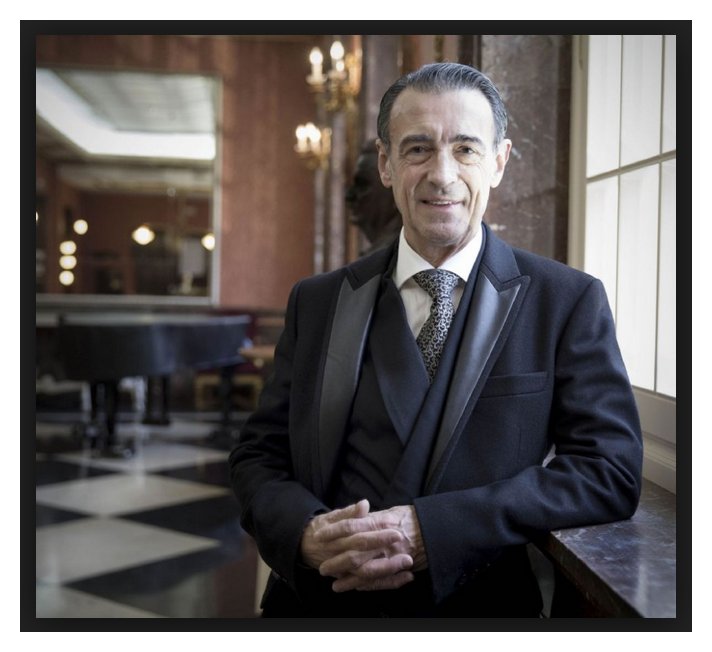 BD: Do you want to
write to the critic and say, “Hey, you blew it!”?
BD: Do you want to
write to the critic and say, “Hey, you blew it!”?
MAG-M: No,
no, no. They have it already very
difficult. They have a very difficult job because they
have to give an opinion and give an impression about one thing that is
very subjective.
All that is subjective, as I said earlier. It is possible
to have a hundred different opinions and all these opinions can be
right. Perhaps we are not good for the critic but we
are very good for all other people... or the opposite is also
possible. It is only information for the
people who are not in theater.
BD: Here in
Chicago, we (had at that time) four major daily papers who sent music
critics, and after reading them I sometimes wondered if they were in
the same hall that night!
MAG-M:
[Laughs] That happens, of course.
BD: Should
the critics perhaps come to the second or
third performance, rather than the first, so you have the opportunity
to get the bugs worked out?
MAG-M: I have
a very special feeling. I
think a critic should be here from the first rehearsal, to see how the
work is, to see the circumstances. They just come to one
performance — any one, first, second, third, any
one. They see
a product and they don’t know how this product was worked out.
BD: But
should the public be aware of the difficulties
you’ve encountered in rehearsals, or the particular problems you
face? Are
you not giving them a finished product to see?
MAG-M: Sure,
of course, but the critic is someone who
specializes, and to be a specialist he has to also see at least the
principal rehearsals, to see how that works
because he’s not public. He’s a critic. He’s somebody who
can make influence over the public.
BD: But
should he not be part of the public rather
than part of the opera house?
MAG-M: No, he
should be in the middle, exactly in the middle.
BD: [With
somewhat genuine concern] And then he becomes torn apart?
MAG-M: Well,
that would be much more difficult for him. [Huge laugh] I
want a person who
wants to do his best or her best, and not to look just for the more
comfortable way. They have to make the way to do it better.
If it is more difficult, well, it’s a pity but it’s more
difficult. Until now I just know one critic who goes to the
rehearsals. He lives in
Madrid, and he’s a very hard one. When I read any critic, I know
in one moment if this man
understands something or not. I know if it is a real
understanding, or just because he
is used to hearing music and he doesn’t hear very well. We can
distinguish this very well, and from this one who is making a
constructive criticism I am very thankful. I am much more
thankful to him than to one who is making a
wonderful criticism but I see that he doesn’t understand
anything. I am
thankful because he’s very kind, and he made a very good critic.
That is the only way. I am very thankful because I
can learn something.
BD: So you do
learn from the critic occasionally?
MAG-M: That
is very rare, but sometimes there are things you can
take note of.
BD: Do you
read the critic after the first performance, or do you wait until the
run is over?
MAG-M: I read
them when they come out!
BD: I just
wondered if they would
influence you for the second and third performances?
MAG-M:
Normally it is not an influence what
you’ve heard from the critic. A critic can give you an idea for a
next production, but not for a next performance because it would be
dangerous to change anything then.
BD: One of
the singers told me
that they get all the critics, but then read them after the last
performance.
MAG-M: No,
no, no. I read it when they come
because the influence will not affect me. When I have
learned a score I also hear other performances. I take
records. If it is on the radio I will hear it also. Maybe
if I have time I can go to
another performance, but it doesn’t make any influence. I have my
criteria
and it is there, and if I see that I’ve made a mistake, I adjust.
Normally
from the critic I don’t see that I made a mistake. I see it
sometimes by myself, or sometimes because the practice teaches one that
this is not correct, or less correct than if you do it another way.
BD: You know
whether you’ve done a good
performance.
MAG-M: Sure,
sure, in this sense I don’t need any
critic. [Laughs]
BD: It’s
almost like being at the university.
When you’re an undergraduate,
you wait until you get the exam back to see what grade you’ve
got. When you are a graduate student doing your Master’s work,
you know
when you’ve finished the examination what grade you will get.
Then when you’re going for your doctorate, you know
before you go into the examination room what grade you will get!
MAG-M:
Exactly, exactly, so is it! [Roars of
laughter]
*
* *
* *
BD: Is this
your first time in Chicago?
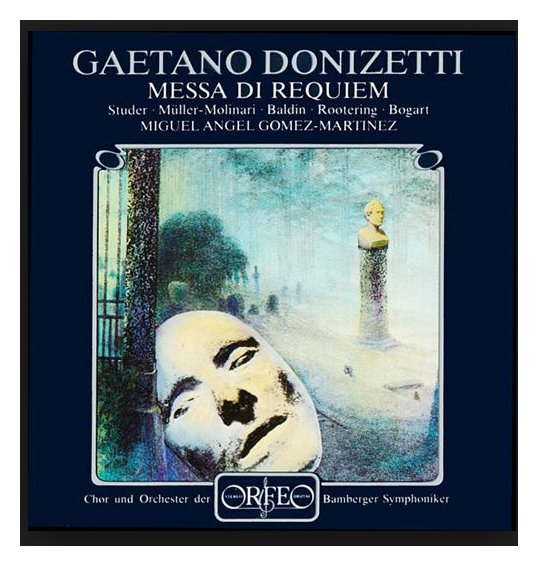 MAG-M: Yes.
MAG-M: Yes.
BD: Have you
seen any of the city, or have we kept you
too busy?
MAG-M: I am
beginning now to see something from the city
because today was the first day I had a morning free. Yesterday I
had something in the morning but I couldn’t do any sight-seeing.
But I want to visit all possible things because
this is normally the first thing I do when I come to a new city.
BD: Do you
like Chicago?
MAG-M: So
far, yes!
BD: Will you
be coming back?
MAG-M: We
will see. They didn’t tell me anything
yet. Yesterday we were speaking about
this, and Ardis
Krainik said, “You will come back soon!”
But they
didn’t tell me anything precise. It is
a very good atmosphere here. I am happy and hope to return, but it
would have to be for a time I am not booked, and
until 1984 or so it is really difficult to get me now. [He
would come back in the 1986-87 season for the same production of Butterfly with Anna Tomowa-Sintow, Peter
Dvorsky, Richard
Stilwell, Sharon
Graham, and Mark
Doss in the cast.]
BD: How far
ahead are you booked?
MAG-M: Oh, I
have several contracts until
1986.
BD: Do you
like know that on a certain Thursday in July you’re
going to be in a certain theater doing a certain opera, or in a certain
concert hall?
MAG-M: It’s a
good feeling. It is better than not
knowing what you will do there! [Yet another huge laugh]
BD: You are
very busy. Do you have enough time
to study your scores?
MAG-M: I am
studying any time when I have time. I
have to organize also the new things, not to put them all buried
together because I would not be able to do it that way. Now it
was difficult
because this unexpected thing with Luisa
Miller. I had conducted
Luisa Miller a long time ago,
and so it was almost a new thing for me
when I started with this, and, of course, that took a little
time from my organization. But I have arranged it again. I
have
taught myself on the plane! [Much laughter]
BD: Do
you have any special routines before performance? Do you get any
extra rest, or eat special foods?
MAG-M: The
only thing I don’t do is work very much
because in the performance I have to stay a long time and I want to be
rested. I never look at a score what I am conducting on the
evening, or at the program of the concert. I have the time
before. What I didn’t
learn in the time that I am learning it, I will not learn in two hours,
so I leave it. I keep my hands away from music, or at least
of the music I am conducting. I read a book or I see
television, or I talk with friends or something like
this. Then what has to be is in the break I have to a drink
beer and at the end another one, because if not, all that I
sweat will be out and I would not have anything inside... and water is
too sad for me! [Laughs]
BD: Thank you
so much for speaking with me during this very busy time.
MAG-M: Thank
you also.
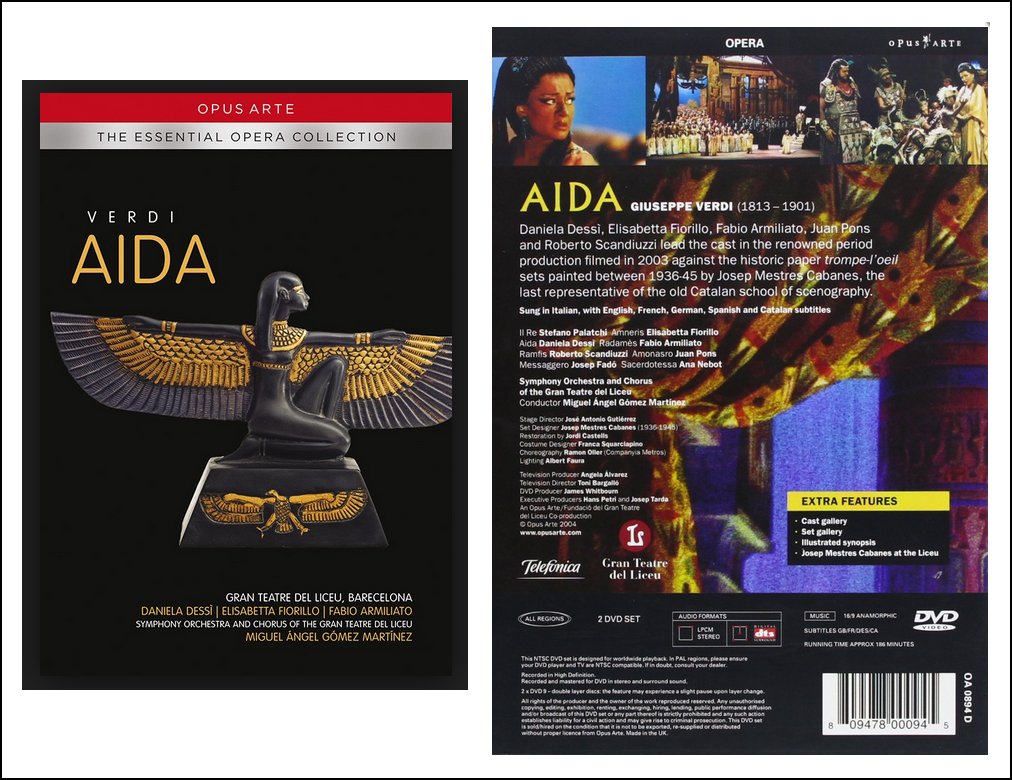
© 1982 Bruce Duffie
This conversation was recorded in Chicago on December 2,
1982. Portions were broadcast on WNIB in 1989,
and again in 1994 and 1999.
This transcription was made in 2016, and posted on this
website
at that time. My thanks to British soprano Una
Barry for her help in preparing this website
presentation.
To see a full list (with links) of interviews which have been
transcribed and posted on this website, click here.
Award
- winning
broadcaster
Bruce Duffie was with WNIB, Classical 97 in Chicago from 1975
until
its final moment as a classical station in February of 2001. His
interviews have also appeared in various magazines and journals since
1980,
and he now continues his broadcast series on WNUR-FM, as well
as
on Contemporary Classical Internet Radio.
You are invited to visit his website
for more information about his work, including selected transcripts of
other interviews, plus a full list of his guests. He would also
like
to call your attention to the photos and information about his
grandfather, who was a pioneer in the automotive field more than a
century ago. You may also send him E-Mail
with comments, questions and suggestions.


 BD: Is this your
American debut?
BD: Is this your
American debut? BD: In this first
concert did you find that the musicians respected you, or were they
more amused that
this was a seven-year old squirt on the podium?
BD: In this first
concert did you find that the musicians respected you, or were they
more amused that
this was a seven-year old squirt on the podium? MAG-M: It is
something between everything, and you know
there are also Spanish operas. The Zarzuela is more between
a musical and operetta with very much things of opera because
the quality of the music sometimes can be compared to Verdi. It
is often very good, but not
every one. There are also very bad ones, but many of them
are very, very good. I’m thinking, for example, of Guridi.
Guridi
is one of the composers I named before, and he has wonderful
Zarzuela named El Caserio.
It is about Basquian
motives because he was born in the Basque land. This is very,
very interesting music, very folkloristic but really made well with
very good technical work and not very many
speaking places. That means it is, in a way, like
Zauberflöte or Fidelio, because it is also opera
with spoken text.
MAG-M: It is
something between everything, and you know
there are also Spanish operas. The Zarzuela is more between
a musical and operetta with very much things of opera because
the quality of the music sometimes can be compared to Verdi. It
is often very good, but not
every one. There are also very bad ones, but many of them
are very, very good. I’m thinking, for example, of Guridi.
Guridi
is one of the composers I named before, and he has wonderful
Zarzuela named El Caserio.
It is about Basquian
motives because he was born in the Basque land. This is very,
very interesting music, very folkloristic but really made well with
very good technical work and not very many
speaking places. That means it is, in a way, like
Zauberflöte or Fidelio, because it is also opera
with spoken text. MAG-M: It is like a
sword with two
sides. Of course, if the public don’t understand exactly what is
happening on the stage, they will not like the opera so much as
understanding exactly everything. But musically I have to
distinguish between these two things. Musically the only way to
do the opera correctly is in the original language because the composer
chooses his melody for these words and exactly these words
with this movement and with these accents, and if you change it, it
doesn’t work.
MAG-M: It is like a
sword with two
sides. Of course, if the public don’t understand exactly what is
happening on the stage, they will not like the opera so much as
understanding exactly everything. But musically I have to
distinguish between these two things. Musically the only way to
do the opera correctly is in the original language because the composer
chooses his melody for these words and exactly these words
with this movement and with these accents, and if you change it, it
doesn’t work. MAG-M: Sure,
sure! If I don’t like a
full evening in an opera, or a full concert with this kind of music,
then I don’t think I would do it.
MAG-M: Sure,
sure! If I don’t like a
full evening in an opera, or a full concert with this kind of music,
then I don’t think I would do it. Hans Swarowsky (September 16,
1899 – September 10, 1975) was born in Budapest, Hungary. He studied
the art of conducting under Felix Weingartner and Richard Strauss. His
teachers in musical theory included Arnold Schoenberg and Anton Webern.
Hans Swarowsky (September 16,
1899 – September 10, 1975) was born in Budapest, Hungary. He studied
the art of conducting under Felix Weingartner and Richard Strauss. His
teachers in musical theory included Arnold Schoenberg and Anton Webern.
 MAG-M: Not here in
the U.S., and not in England, but sometimes in
Germany and Switzerland, yes.
MAG-M: Not here in
the U.S., and not in England, but sometimes in
Germany and Switzerland, yes. MAG-M: I
go. I don’t go very often because when I
am not performing I am normally preparing other things. But when
I go to other performances, then I suffer
sometimes because I am feeling with the problems which are
happening there. In every performance there are
mistakes, and being a conductor there are things that you have to
correct. If I am conducting, I don’t care because I know I will
correct it anyway. I don’t know how, but I will; but I don’t
know if he
will. I am sure he will, but this feeling is difficult to
explain.
MAG-M: I
go. I don’t go very often because when I
am not performing I am normally preparing other things. But when
I go to other performances, then I suffer
sometimes because I am feeling with the problems which are
happening there. In every performance there are
mistakes, and being a conductor there are things that you have to
correct. If I am conducting, I don’t care because I know I will
correct it anyway. I don’t know how, but I will; but I don’t
know if he
will. I am sure he will, but this feeling is difficult to
explain. 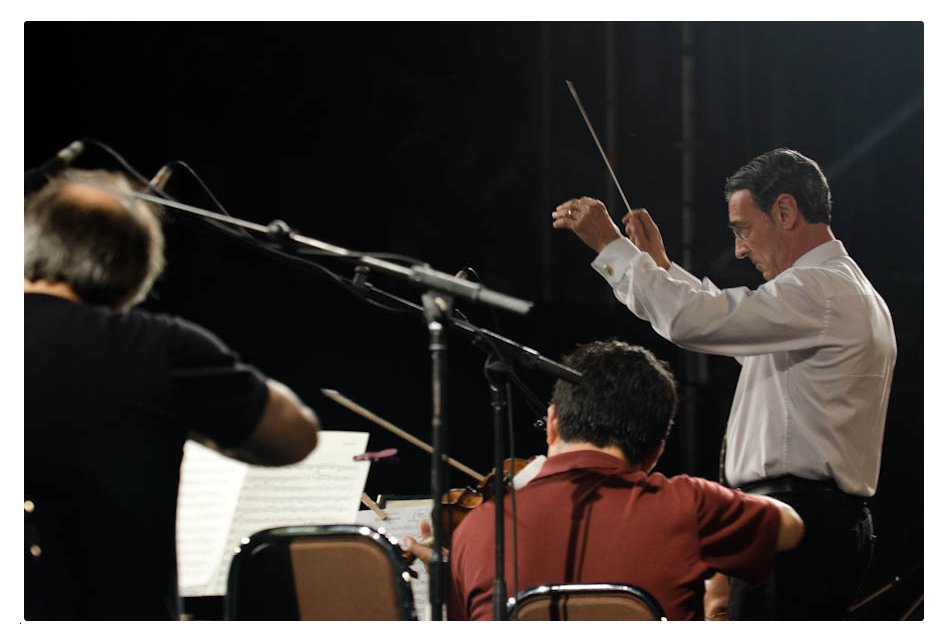
 MAG-M: Yes, sure
— not very much in
performances, but in rehearsals very often. I’m always asking the
orchestra to play less! It is really difficult to get this
balance, very, very difficult. You cannot hear a real forte when only one
singer is singing.
MAG-M: Yes, sure
— not very much in
performances, but in rehearsals very often. I’m always asking the
orchestra to play less! It is really difficult to get this
balance, very, very difficult. You cannot hear a real forte when only one
singer is singing. BD: Did you not
want to reseat the orchestra?
BD: Did you not
want to reseat the orchestra? BD: Is it a mistake
of Verdi that you don’t
hear from the pit what you see on the stage?
BD: Is it a mistake
of Verdi that you don’t
hear from the pit what you see on the stage? BD: Is that not too
much? It would have to mesh perfectly in order to work.
BD: Is that not too
much? It would have to mesh perfectly in order to work. MAG-M: Visually it’s
wonderful, not like all the
old-fashioned theaters of horse-shoe form where many of the
people who are sitting on the sides cannot see. Acoustically I
don’t know how it is in the audience hall because I was so busy
that I couldn’t come to any other performance. I will come to one
of the student Butterfly
afternoons because I am interested and I want to hear one of
them. So I
will see how the acoustic is then.
MAG-M: Visually it’s
wonderful, not like all the
old-fashioned theaters of horse-shoe form where many of the
people who are sitting on the sides cannot see. Acoustically I
don’t know how it is in the audience hall because I was so busy
that I couldn’t come to any other performance. I will come to one
of the student Butterfly
afternoons because I am interested and I want to hear one of
them. So I
will see how the acoustic is then. BD: Do you want to
write to the critic and say, “Hey, you blew it!”?
BD: Do you want to
write to the critic and say, “Hey, you blew it!”? MAG-M: Yes.
MAG-M: Yes.